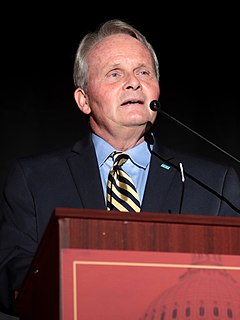A Quote by James Surowiecki
The world's central banks and the International Monetary Fund still have vaults full of bullion, even though currencies are no longer backed by gold. Governments hold on to it as a kind of magic symbol, a way of reassuring people that their money is real.
Related Quotes
Central banks are choosing to increase their gold holdings as a percentage of total reserves. They obviously think there is a reason to do that. It doesn't make sense to back up one currency with a hoard of other paper currencies. There needs to be a real anchor there. I think that central banks are well behind the curve. If you look at the percentage of above-ground gold controlled by central banks, it's historically low. Hence the fact that central banks are trying to increase their holdings. They've got a long way to go to get where they need to be.
When you own gold you're fighting every central bank in the world. That's because gold is a currency that competes with government currencies and has a powerful influence on interest rates and the price of government bonds. And that's why central banks long have tried to suppress the price of gold. Gold is the ticket out of the central banking system, the escape from coercive central bank and government power.
Bitcoin has been described as a decentralized, peer-to-peer virtual currency that is used like money - it can be exchanged for traditional currencies such as the U.S. dollar or used to purchase goods or services, usually online. Unlike traditional currencies, Bitcoin operates without central authority or banks and is not backed by any government.
Miners produce the bullion. If there is going to be more demand for gold from investors and central banks, where is the gold going to come from? They have to dig it out of the ground and sell it. As the price of gold goes higher, their profit margins increase. So if you are very bullish like I am and think there is going to be a big increase in gold, it's a huge opportunity for miners.
In practice [monetary management] is merely a high-sounding euphemism for continuous currency debasement. It consists of constant lying in order to support constant swindling. Instead of automatic currencies based on gold, people are forced to take managed currencies based on guile. Instead of precious metals they hold paper promises whose value falls with every bureaucratic whim. And they are suavely assured that only hopelessly antiquated minds dream of returning to truth and honesty and solvency and gold.
It is a sobering fact that the prominence of central banks in this century has coincided with a general tendency towards more inflation, not less. [I]f the overriding objective is price stability, we did better with the nineteenth-century gold standard and passive central banks, with currency boards, or even with 'free banking.' The truly unique power of a central bank, after all, is the power to create money, and ultimately the power to create is the power to destroy.
Monetary reform, if it is to be genuine and successful, must sever money and banking from politics. That's why a modern gold standard must have: no central bank; no fixed rations between gold and silver; no bail-outs; no suspension of gold payments or other bank frauds; no monetization of debt; and no inflation of the money supply, all of which have proved so disastrous in the past.
Complementary currencies work in addition to existing money, rather than replacing existing, official money. There are whole different families of complementary currencies. One of them is local currencies. One is regional currencies. Another is functional currencies. Another is social-purpose currencies.
Most paper money initially existed as a substitute for gold. That's what gave it value. But right now what gives a currency value is other currency. Most countries hold reserves and the reserves are other currencies. If you are a backing up the euro with the dollar, what's backing up the dollar? I don't think it is going to go to a point where all you have is coins and bars of gold, but I do think that we are going to have to go back to a monetary system based in gold, not based on paper.































